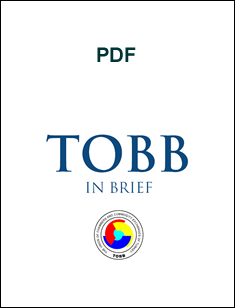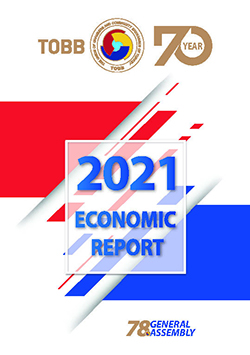TOBB Chambers of Maritime Trade Council Meeting

07.01.2025 / Ankara
The Union of Chambers and Commodity Exchanges of Türkiye (TOBB) Chambers of Maritime Trade Council Meeting was hosted by TOBB President M. Rifat Hisarcıklıoğlu at TOBB Twin Towers with the participation of Murat Kurum, Minister of Environment, Urbanization and Climate Change, Durmuş Ünüvar, Deputy Minister of Transport and Infrastructure, and council members.
Speaking at the opening of the meeting, TOBB President M. Rifat Hisarcıklıoğlu said that the Council of Chambers of Maritime Trade’s consultations with the government had yielded positive results.
Stating that the number of shipyards, marinas and boat mooring capacity had been significantly increased and the lease period of shipyards had been extended, Hisarcıklıoğlu said:
“We have become a globally recognized brand in the shipbuilding industry. We have reached the capacity to build all kinds of ships on turnkey basis. Beyond being self-sufficient, we have started to export all kinds of ships to the whole world. Turkish maritime has gained a good momentum and has become one of the star sectors of our country.”
- “Maritime transportation is vital for global trade”
Explaining that the Turkish-owned ship fleet has risen to 11th place in the world with approximately 52 million tons, Hisarcıklıoğlu said, “56 percent of the country’s exports, that is, $145 billion worth of agricultural and industrial products were sent by sea.”
Stating that the developments in the maritime sector have a great share in the uninterrupted growth of the economy for almost 14 years, Hisarcıklıoğlu made the following assessment:
“Because without transportation, neither the factory can work nor the products can reach the market. Our goal should be to maintain and increase this performance we have achieved. In 2024, global trade volume increased by 1 trillion dollars compared to the previous year and reached 33 trillion dollars, reaching its historical peak, and will continue to increase in 2025. A large part of this is through sea routes. Therefore, maritime transportation is vital for global trade. We should also get our share from this.”
- “We must support our shipbuilding industry”
Hisarcıklıoğlu pointed out that the public and private sectors should continue to work together in line with Türkiye’s goal of becoming one of the top 10 economies in the world, and stated that maritime, which is the most strategic sector in global trade, should be seen as a national asset and wealth.
Pointing out the importance of maintaining the vitality and functionality of the maritime sector, Hisarcıklıoğlu said, “Otherwise, the increasing trade volume will benefit foreign transportation companies. We need to further expand and support our shipbuilding industry, maritime transportation and ports in line with our export targets. We must strengthen our naval fleet and ship industry, and renew our coaster fleet.”
Hisarcıklıoğlu pointed out that the way to develop the ship fleet is to strengthen the shipyards and stated that the competitiveness of the ship and yacht building industry should be increased by equipping it with innovative technologies.
Emphasizing that environmental penalties, which are one of the biggest problems of ships arriving at the country’s ports and shipyards, should be similar to international practices, Hisarcıklıoğlu used the following statements:
“We need to increase diversity with incentives that will enable cruise ships to call at our other ports. The biggest challenge to the growth of our sector is still in obtaining financing. We are weak against our competitors due to various restrictions on commercial loans. Another important issue for the future of the maritime sector is the green transformation. Additional investment and financing is needed to cover the cost of this. We believe that we will make our maritime sector stronger and more competitive by taking steps to expand our maritime trade fleet and improve the capacity of our ports. We are ready to work to provide new and more comprehensive services to our industry.”
- Deputy Minister of Transport and Infrastructure Durmuş Ünüvar
Durmuş Ünüvar, Deputy Minister of Transport and Infrastructure, stated that they will support the maritime sector for green transformation and renew the maritime fleet.
Stating that they have increased legal regulations and inspections to develop maritime, Ünüvar said, “We paved the way for investments, developed our ports and shipyards, equipped our coasts with marine structures, encouraged maritime transportation, and established ship tracking and control systems for the safety of navigation, life, property and the environment on our coasts to establish safe and secure maritime transportation.”
Pointing out that the Turkish flag is among the most prestigious flags in the world, Ünüvar stated that the Turkish-owned fleet has risen to 11th place in the world.
Stating that the number of passengers carried by cruise ships last year was 1.9 million, Ünüvar said that they will host over 2 million passengers this year.
Reminding that they implemented the SCT-free fuel application in 2024 in order to share the burden on seafarers, Ünüvar used the following statements: “We provided approximately 3.9 billion liras of SCT-free fuel support to our sector. We will support our maritime sector for green transformation and renew our maritime fleet. We have established the support mechanism within the scope of the regulation on the incentive for the construction of new ships to replace the scrapped Turkish flagged ships that we put into force for green transformation in maritime and renewed in March. In this context, we have provided an incentive of 14 million dollars for 4 ships so far. This year, we aim to renew more ships and adapt to environmentally friendly technologies by improving the scope of incentives.”
Your message has been sent
Thank you |




